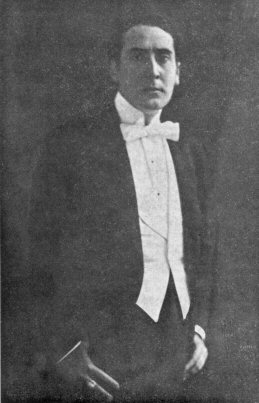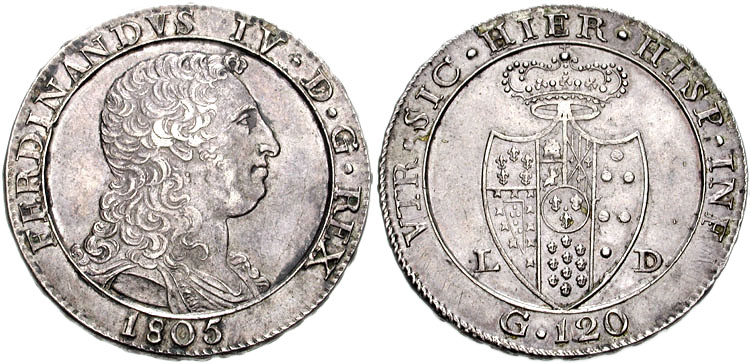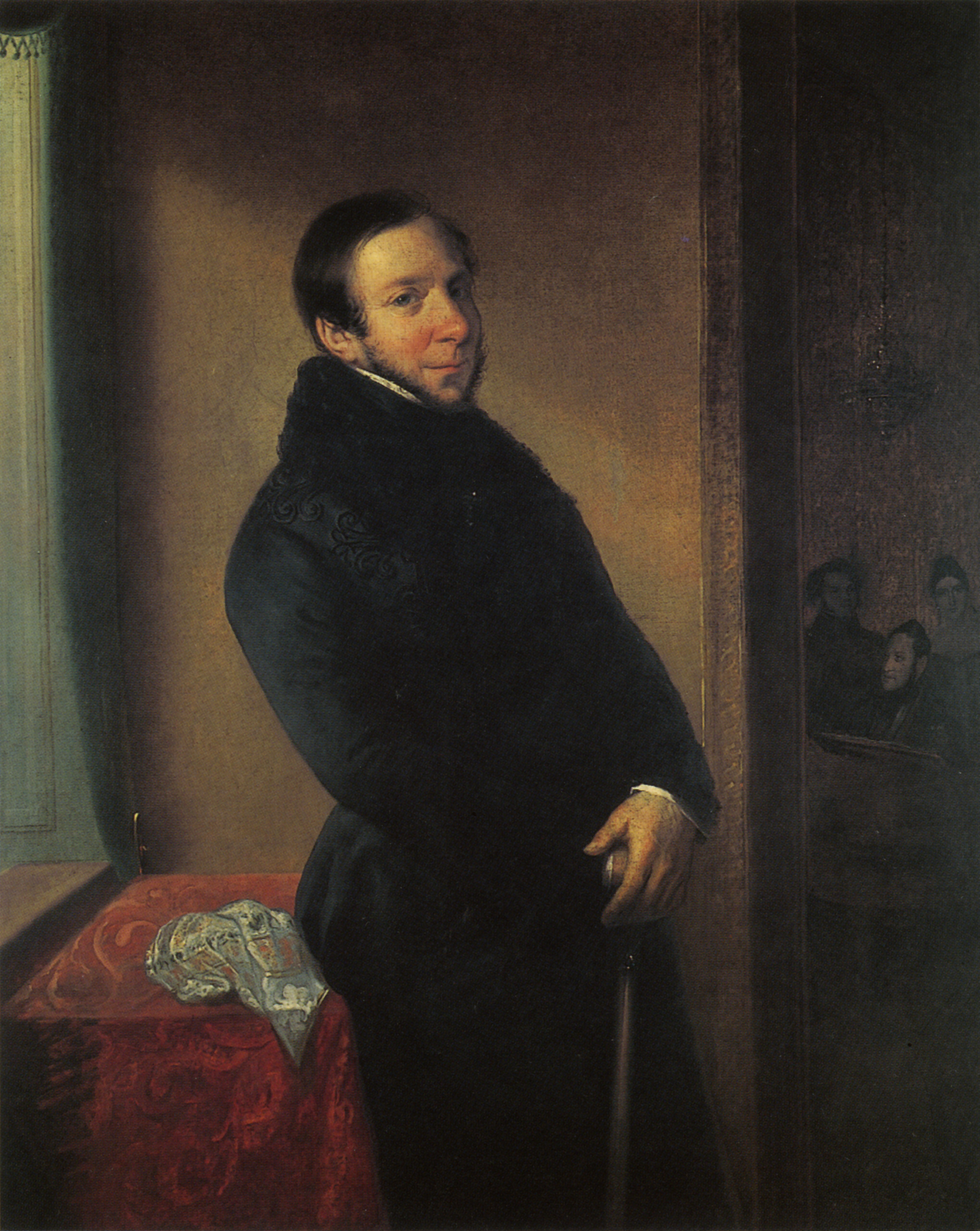|
Rossini (film)
''Rossini'' is a 1942 Italian musical drama film directed by Mario Bonnard and starring Nino Besozzi, Paola Barbara, Camillo Pilotto, Armando Falconi and Greta Gonda. It depicts adult life events of Italian composer Gioachino Rossini. It was shot at the Pisorno Studios in Tirrenia. The film's sets were designed by the art director Piero Filippone. Plot Cast *Nino Besozzi as Gioachino Rossini *Paola Barbara as Isabella Colbran *Camillo Pilotto as Domenico Barbaja * Armando Falconi as Ferdinand I of the Two Sicilies *Greta Gonda as Teresa Coralli *Memo Benassi as Ludwig van Beethoven *Cesare Fantoni as Niccolò Paganini *Edoardo Toniolo as Rossini's and Paganini's Friend *Paolo Stoppa as Andrea Leone Tottola *Gildo Bocci as Duke Sforza-Cesarini *Lamberto Picasso as Col. Negri * Giacomo Moschini as Duke Carafa * Gilda Marchiò as Anna Guidarini, Rossini's Mother * Massimo Pianforini as Professor Carpassi * Romolo Costa as Austrian Prince * Vera Ruberti as Viennese Noblewoma ... [...More Info...] [...Related Items...] OR: [Wikipedia] [Google] [Baidu] |
Mario Bonnard
Mario Bonnard (24 December 1889 – 22 March 1965) was an Italian actor and film director. Bonnard was born and died in Rome. He began his cinematic career as an actor becoming a popular romantic lead in numerous silent films made before World War I. In 1917 he ventured into film directing for the first time. Before the arrival of sound films he worked for a period in Germany in films directed by Luis Trenker. Back in Italy in 1932, he became a prolific director working with the major stars of the time as: Assia Noris, Elsa Merlini, Amedeo Nazzari, Luisa Ferida, Henry Viarisio. ''Il feroce Saladino'' (1937) was the most popular of his films of the 1930s. During the war he continued to work. In the post World War II period his films, ranging from comedies to period dramas enjoyed much success. However, today he's no longer well known. One of his last films was ''The Last Days of Pompeii (1959 film), The Last Days of Pompeii'' (1959). An illness made him leave production early, so ... [...More Info...] [...Related Items...] OR: [Wikipedia] [Google] [Baidu] |
Armando Falconi
Armando Falconi (1871–1954) was an Italian stage and film actor who appeared in more than forty films during his career. He played the lead in the 1931 comedy '' The Charmer''.Landy p.63-65 Life and career Born in Rome, Falconi was the son of two Neapolitan stage actors. His elder brother Arturo Falconi also became an actor. He first worked as an employee and an officer before starting to work as a professional actor in the late 1890s. In 1901 he married the actress Tina Di Lorenzo, with whom he often teamed up on stage. Following several national and foreign tours, in 1912 he founded the Stable Company of the Manzoni Theatre in Milan. Following the retirement of his wife in 1920, he directed the company Compagnia Comoedia, and headed in a number of other companies, notably having a remarkable success with the musical comedy ''Wunder Bar''. After having appeared in some silent films between 1915 and 1918, in the 1930s Falconi intensified his cinema activities, starring in a ... [...More Info...] [...Related Items...] OR: [Wikipedia] [Google] [Baidu] |
Paolo Stoppa
Paolo Stoppa Knight Grand Cross (6 June 1906 – 1 May 1988) was an Italian actor. Biography Born in Rome, he began as a stage actor in 1927 in the theater in Rome and began acting in films in 1932. As a stage actor, his most celebrated works include those after World War II, when he met director Luchino Visconti: the two, together with Stoppa's wife, actress Rina Morelli, formed a trio whose adaptations of works by authors such as Chekhov, Shakespeare and Goldoni became highly acclaimed. He gave to the theater a personal touch with his energetic play. He debuted in television in 1960 in the drama series ''Vita col padre e con la madre'', reaching the top of the popularity in the 1970s, in particular in the adaptation of crime novels by Friedrich Dürrenmatt (''Il giudice e il suo boia'' and ''Il sospetto'') and Augusto De Angelis. As a film actor, Stoppa made some 194 appearances between 1932 and his retirement in 1983, with roles in popular classics such as '' Miraco ... [...More Info...] [...Related Items...] OR: [Wikipedia] [Google] [Baidu] |
Edoardo Toniolo
Edoardo Toniolo (22 November 1907 - 31 December 1986) was an Italian actor and voice actor. Life and career Born in Turin, the son of the stage actors Antonio and Rosa Rosaz, at young age Toniolo debuted on stage in supporting roles. He later worked on radio, and in the mid-1930s he started appearing in films, usually in character roles. After the Second World War, and following his role as leading actor in Ferruccio Cerio's ''Posto di blocco'', Toniolo also started working as a dubber, and since 1954 he was also pretty active in television dramas. He was sometimes credited as Edward Douglas. Selected filmography * ''Villafranca'' (1934) * ''Abandon All Hope'' (1937) * ''In the Country Fell a Star'' (1939) * ''The King's Jester'' (1941) * '' Rossini'' (1942) * ''Angelo tra la folla'' (1950) * ''La figlia del diavolo'' (1952) * '' The Legend of the Piave'' (1952) * ''Rivalry'' (1953) * ''Captain Phantom'' (1953) * '' Angels of Darkness'' (1954) * ''Symphony of Love'' (195 ... [...More Info...] [...Related Items...] OR: [Wikipedia] [Google] [Baidu] |
Niccolò Paganini
Niccolò (or Nicolò) Paganini (; 27 October 178227 May 1840) was an Italian violinist and composer. He was the most celebrated violin virtuoso of his time, and left his mark as one of the pillars of modern violin technique. His 24 Caprices for Solo Violin Op. 1 are among the best known of his compositions and have served as an inspiration for many prominent composers. Biography Childhood Niccolò Paganini was born in Genoa (then capital of the Republic of Genoa) on 27 October 1782, the third of the six children of Antonio and Teresa (née Bocciardo) Paganini. Paganini's father was an unsuccessful trader, but he managed to supplement his income by playing music on the mandolin. At the age of five, Paganini started learning the mandolin from his father and moved to the violin by the age of seven. His musical talents were quickly recognized, earning him numerous scholarships for violin lessons. The young Paganini studied under various local violinists, including Giovanni Serve ... [...More Info...] [...Related Items...] OR: [Wikipedia] [Google] [Baidu] |
Cesare Fantoni
Cesare Fantoni (1 January 1905 – 15 January 1963) was an Italian actor and voice actor. Biography Born in Bologna, Fantoni began his acting career in Luchino Visconti’s stage proses until making his first on-screen appearance in 1937. He made his debut film appearance in '' Doctor Antonio''. He then appeared in more than 70 films between 1939 and 1962. Fantoni made light appearances later in his career as Don Ignazio in the films '' The Overtaxed'' and '' Letto a tre piazze''. Fantoni was also a voice actor, dubbing foreign films for release in the Italian market. (in Italian) He dubbed the voices of |
Ludwig Van Beethoven
Ludwig van Beethoven (baptised 17 December 177026 March 1827) was a German composer and pianist. Beethoven remains one of the most admired composers in the history of Western music; his works rank amongst the most performed of the classical music repertoire and span the transition from the Classical period to the Romantic era in classical music. His career has conventionally been divided into early, middle, and late periods. His early period, during which he forged his craft, is typically considered to have lasted until 1802. From 1802 to around 1812, his middle period showed an individual development from the styles of Joseph Haydn and Wolfgang Amadeus Mozart, and is sometimes characterized as heroic. During this time, he began to grow increasingly deaf. In his late period, from 1812 to 1827, he extended his innovations in musical form and expression. Beethoven was born in Bonn. His musical talent was obvious at an early age. He was initially harshly and intensively tau ... [...More Info...] [...Related Items...] OR: [Wikipedia] [Google] [Baidu] |
Memo Benassi
Domenico "Memo" Benassi (21 June 1886 – 24 February 1957) was an Italian film actor who appeared in more than forty films in a mixture of leading and supporting roles. He played the composer Beethoven in the 1942 film '' Rossini''.Mathew & Walton p.337 Selected filmography * ''Notte di tempesta'' (1916) * ''Mimì e gli straccioni'' (1916) * ''Il gioiello sinistro'' (1917) * ''La nemica'' (1917) * ''Margheritella'' (1918) * ''La scala di seta'' (1920) * ''The Love Letters of Baroness S'' (1924) - Straßenmusikant Giovanni * ''The Adventures of Sybil Brent'' (1925) - Theo Hartwig, Schriftsteller * ''The Old Lady'' (1932) - Joe * '' The Lucky Diamond'' (1933) - Il maggiordomo * ''Il trattato scomparso'' (1933) - John Brown - detective * ''The Haller Case'' (1933) - Judge Haller * ''L'impiegata di papà'' (1934) - Banchiere Monti * ''Everybody's Woman'' (1934) - Leonardo Nanni * ''Conquest of the Air'' (1936) - Francesco Lama di Brescia (uncredited) * '' Lady of Paradise'' (1937) ... [...More Info...] [...Related Items...] OR: [Wikipedia] [Google] [Baidu] |
Ferdinand I Of The Two Sicilies
Ferdinand I (12 January 1751 – 4 January 1825) was the King of the Two Sicilies from 1816, after his restoration following victory in the Napoleonic Wars. Before that he had been, since 1759, Ferdinand IV of the Kingdom of Naples and Ferdinand III of the Kingdom of Sicily. He was also King of Gozo. He was deposed twice from the throne of Naples: once by the revolutionary Parthenopean Republic for six months in 1799 and again by Napoleon in 1805, before being restored in 1816. Ferdinand was the third son of King Charles VII of Naples and V of Sicily by his wife, Maria Amalia of Saxony. On 10 August 1759, Charles succeeded his elder brother, Ferdinand VI, becoming King Charles III of Spain, but treaty provisions made him ineligible to hold all three crowns. On 6 October, he abdicated his Neapolitan and Sicilian titles in favour of his third son, because his eldest son Philip had been excluded from succession due to imbecility and his second son Charles was heir-apparent to the S ... [...More Info...] [...Related Items...] OR: [Wikipedia] [Google] [Baidu] |
Domenico Barbaja
Domenico Barbaia (also spelled Barbaja; 10 August 1777 – 19 October 1841) was best known as an opera Italian impresario. An energetic man, Barbaia, who was born in Milan, began his career by running a coffee shop. He made his first fortune by creating (or at least taking the credit for creating) a special kind of coffee with frothing milk, the " Barbajada", probably the first "cappuccino." This drink, and a variation with hot chocolate like Bicerin, became so popular in Milan that the erstwhile waiter was able to open a string of coffee houses in the city that all featured his novel concoction. Barbaia made his second fortune by buying and selling munitions during the Napoleonic wars. Also, after the French re-allowed gambling as they advanced southwards in Italy, he became involved in the operations as a card dealer at the La Scala opera house, but quickly achieved the position of sub-contractor to run the entire gaming operation of the house in 1805. With his eyes on contro ... [...More Info...] [...Related Items...] OR: [Wikipedia] [Google] [Baidu] |
Isabella Colbran
Isabella Angela Colbran (2 February 1785 – 7 October 1845) was a Spanish opera soprano and composer. She was known as the muse and first wife of composer Gioachino Rossini. Early years Colbran was born in Madrid, Spain, to Giovanni Colbran, King of Spain Carlo III's head court musician and violinist, and Teresa Ortola. She started her musical studies as a singer and composer at the age of six with composer and cellist Francisco Parjea, castrato Carlo Martinelli, and famous castrato and composer Girolamo Crescentini. In 1801, Colbran and her father moved to Paris where she made her concert debut and was warmly received by Napoleon's court. Both of them traveled to Italy, going to Milan, Venice, Rome, before settling and moving permanently to Naples. She inherited land in Sicily and a villa in Castenaso in 1820, after her father's death. Opera career Colbran's dramatic soprano voice and sizable three octave range allowed her to have extremely successful opera career. S ... [...More Info...] [...Related Items...] OR: [Wikipedia] [Google] [Baidu] |
Piero Filippone
Piero Filippone (1911–1998) was an Italian art director who designed the sets for around two hundred films. He created the sets for Roberto Rossellini's 1954 film '' Journey to Italy''.Brunette p.416 Selected filmography * '' Three Cornered Hat'' (1935) * '' The Lady in White'' (1938) * '' For Men Only'' (1938) * '' We Were Seven Widows'' (1939) * '' Defendant, Stand Up!'' (1939) * '' The Pirate's Dream'' (1940) * '' Then We'll Get a Divorce'' (1940) * '' Big Shoes'' (1940) * '' Marco Visconti'' (1941) * ''Bluebeard'' (1941) * '' Seven Years of Good Luck'' (1942) * '' I Live as I Please'' (1942) * ''Happy Days'' (1942) * '' Seven Years of Happiness'' (1943) * '' Anything for a Song'' (1943) * ''Lively Teresa'' (1943) * '' Assunta Spina'' (1948) * '' The Elusive Twelve'' (1950) * '' The Merry Widower'' (1950) * ''The Ungrateful Heart'' (1951) * '' Four Red Roses'' (1951) * '' Frontier Wolf'' (1952) * '' The Ship of Condemned Women'' (1953) * '' The Daughter of the Regiment'' (19 ... [...More Info...] [...Related Items...] OR: [Wikipedia] [Google] [Baidu] |





